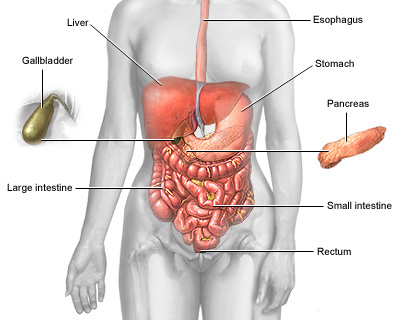Gastroesophageal reflux disease
Contents
Gastroesophageal reflux disease (GERD) is a condition in which the stomach contents (food or liquid) leak backwards from the stomach into the esophagus (the tube from the mouth to the stomach). This action can irritate the esophagus, causing heartburn and other symptoms.

The esophagus, stomach, large and small intestine, aided by the liver, gallbladder and pancreas convert the nutritive components of food into energy and break down the non-nutritive components into waste to be excreted.
CAUSES
When you eat, food passes from the throat to the stomach through the esophagus (also called the food pipe or swallowing tube). Once food is in the stomach, a ring of muscle fibers prevents food from moving backward into the esophagus. These muscle fibers are called the lower esophageal sphincter.
If this sphincter muscle doesn't close well, food, liquid, and stomach acid can leak back into the esophagus. This is called reflux or gastroesophageal reflux. Reflux may cause symptoms, or it can even damage the esophagus.
The risk factors for reflux include:
- Alcohol (possibly)
- Hiatal hernia (a condition in which part of the stomach moves above the diaphragm, which is the muscle that separates the chest and abdominal cavities)
- Obesity
- Pregnancy
- Scleroderma
- Smoking
Heartburn and gastroesophageal reflux can be brought on or made worse by pregnancy and many different medications. Such drugs include:
- Anticholinergics (e.g., for seasickness)
- Beta-blockers for high blood pressure or heart disease
- Bronchodilators for asthma
- Calcium channel blockers for high blood pressure
- Dopamine-active drugs for Parkinson's disease
- Progestin for abnormal menstrual bleeding or birth control
- Sedatives for insomnia or anxiety
- Tricyclic antidepressants
If you suspect that one of your medications may be causing heartburn, talk to your doctor. Never change or stop a medication you take regularly without talking to your doctor.
Symptoms
More common symptoms are:
- Feeling that food is stuck behind the breastbone
- Heartburn or a burning pain in the chest (under the breastbone)
- Increased by bending, stooping, lying down, or eating
- More likely or worse at night
- Relieved by antacids
- Nausea after eating
Less common symptoms are:
- Bringing food back up (regurgitation)
- Cough or wheezing
- Difficulty swallowing
- Hiccups
- Hoarseness or change in voice
- Sore throat
EXAMS AND TESTS
You may not need any tests if your symptoms are not severe.
If your symptoms are severe or they come back after you have been treated, one or more tests may help diagnose reflux or any complications:
- Esophagogastroduodenoscopy (EGD) is often used to find the cause and examine the esophagus (swallowing tube) for damage. The doctor inserts a thin tube with a camera on the end through your mouth. The tube is then passed into your esophagus, stomach, and small intestine.
- Barium swallow
- Continuous esophageal pH monitoring
- Esophageal manometry
A positive stool occult blood test may diagnose bleeding that is coming from the irritation in the esophagus, stomach, or intestines.
TREATMENT
You can make many lifestyle changes to help treat your symptoms. Avoid foods that cause problems for you. Making changes to your routine before you go to sleep may also help.
Avoid drugs such as aspirin, ibuprofen, or naproxen. Take acetaminophen to relieve pain. Take your medicines with plenty of water. When your doctor gives you a new medicine, remember to ask whether it will make your heartburn worse.
You may use over-the-counter antacids after meals and at bedtime, although they do not last very long. Common side effects of antacids include diarrhea or constipation.
Other drugs can treat GERD. They work more slowly than antacids but give you longer relief. Your pharmacist, doctor, or nurse can tell you how to take these drugs.
- Proton pump inhibitors decrease the amount of acid produced in your stomach
- H2 blockers (antagonists) lower the amount of acid released in the stomach
Anti-reflux operations may be an option for patients whose symptoms do not go away with lifestyle changes and drugs. Heartburn and other symptoms should improve after surgery, but you may still need to take drugs for your heartburn.
There are also new therapies for reflux that can be performed through an endoscope (a flexible tube passed through the mouth into the stomach).
OUTLOOK (PROGNOSIS)
Most people respond to lifestyle changes and medications. However, many patients need to continue taking drugs to control their symptoms.
POSSIBLE COMPLICATIONS
- Asthma
- Barrett's esophagus (a change in the lining of the esophagus that can increase the risk of cancer)
- Bronchospasm (irritation and spasm of the airways due to acid)
- Chronic cough or hoarseness
- Dental problems
- Esophageal ulcer
- Stricture (a narrowing of the esophagus due to scarring)
WHEN TO CONTACT A DOCTOR
Call your health care provider if symptoms worsen or do not improve with lifestyle changes or medication.
Also call for any of the following symptoms:
- Bleeding
- Choking (coughing, shortness of breath)
- Feeling filled up quickly when eating
- Frequent vomiting
- Hoarseness
- Loss of appetite
- Trouble swallowing (dysphagia) or pain with swallowing (odynophagia)
- Weight loss

